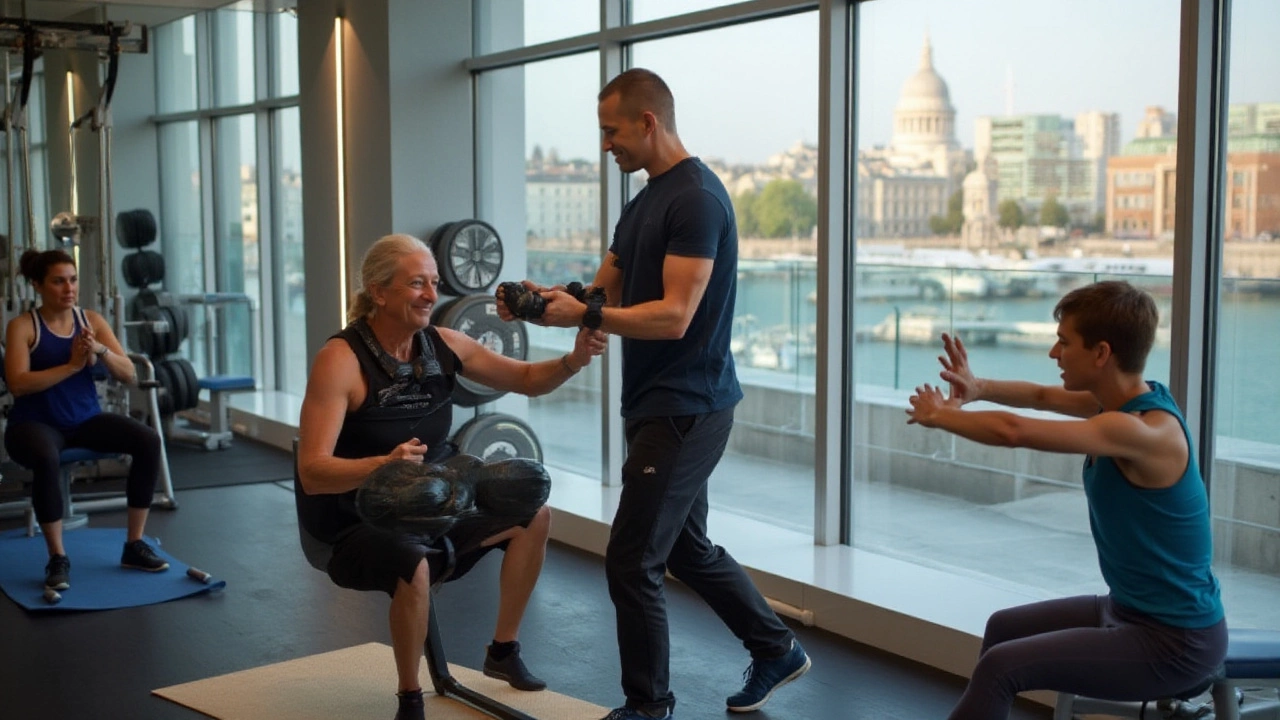
Embarking on the journey to fitness excellence can feel daunting, but it doesn't have to be. The secret lies in knowing where to begin and how to sustain your momentum. Whether you're a seasoned athlete or simply aiming to improve your daily activity, understanding the essentials of getting perfectly fit is crucial.
Fitness is more than just physical strength; it's a harmonious blend of the mind, body, and soul. To achieve this, one must embrace a holistic approach. Envision setting smart, achievable goals, crafting a nutritious yet enjoyable diet, and finding workouts that resonate with your personal style. All these elements together create a vibrant blueprint for success.
Join me as we explore simple yet powerful steps to guide you on this rewarding path. Armed with the right knowledge and a sprinkle of enthusiasm, you’re set to transform your health and fitness dreams into reality.
Setting Realistic Goals
When embarking on a fitness journey, setting realistic goals serves as the compass guiding you through each step. Often, people make the mistake of pursuing unrealistic targets, which can lead to frustration and disappointment. Understanding your body's current capabilities and setting attainable milestones fosters a positive relationship with fitness. Start by assessing where you stand; whether it's your current endurance level, strength, or flexibility. This understanding will help in formulating goals that push you toward progress without overwhelming you.
Creating SMART goals—Specific, Measurable, Achievable, Relevant, and Time-bound—can be your golden ticket to fitness success. Instead of saying, 'I want to get fit,' specify your intent, such as 'I will jog for 20 minutes daily.' This level of clarity makes it easier to track progress and maintain motivation. Set a timeline that offers just enough pressure to keep you moving without encouraging potential burnout. A suggestion might be to use a fitness app to regularly log your workouts and celebrate small victories along the way.
The journey to fitness should always be flavored with self-compassion and flexibility. Life can throw curveballs, so it's crucial to adapt without losing sight of your goals. Listen to your body, and don't hesitate to tweak your plan when necessary. If you're aiming to enhance both strength and endurance, consider alternating between cardio and strength training throughout your week. This mixed approach can prevent monotony and help in achieving a well-rounded level of fitness in the long run.
"Success is the sum of small efforts, repeated day in and day out." – Robert Collier
Research shows that individuals who maintain a fitness routine centered on realistic goals are more likely to experience long-term success. A study from the Journal of Health Psychology highlights how goal-setting behaviors significantly influence exercise adherence. According to the study, those with clear, achievable targets were over 70% more likely to maintain their fitness routines over a six-month period than those without such goals. This underlines the power of clarity and intention in shaping our health and wellness journeys.
Overall, when setting goals, visualize what success looks like for you. Whether it's running a marathon, performing 10 push-ups, or simply feeling energized, know that every small step contributes to the larger picture. Competing against yourself, rather than others, leads to fulfilling and genuine progress. Balance your aspirations with patience, and remember that fitness is a lifelong journey, not a sprint. With the right goals, your path to becoming perfectly fit is not just a destination but an enriching experience.

Balanced Nutrition
Finding the right balance in nutrition is like learning the perfect melody. It's essential for achieving and maintaining a state of vibrant health. The food we eat fuels every step of our fitness journey, and understanding what your body needs is crucial. The core of balanced nutrition lies in consuming a variety of foods that provide essential nutrients: proteins, carbohydrates, and fats. Each one plays a unique role in body function. Proteins are the building blocks of muscle, carbohydrates provide energy, and fats aid in nutrient absorption and cellular health.
The beauty of a balanced diet is its flexibility. You don't need to follow a strict meal plan; instead, learn to listen to your body's signals. Limit processed foods, as they often contain hidden sugars and trans fats, which can derail your fitness goals. Instead, focus on whole foods like fruits, vegetables, lean meats, and whole grains. It's all about creating meals that are as delicious as they are nourishing. And remember, staying hydrated is just as important as what you eat. Water helps to transport nutrients, flush out toxins, and maintain optimal body temperature.
For a deeper dive into nutrition, consider consulting a dietitian who can tailor advice to your specific needs. They can help identify any gaps in your diet or food sensitivities you may have. And don’t underestimate the power of mindful eating. Slow down, savor each bite, and enjoy the taste and texture of your meals. This habit not only enhances digestion but also prevents overeating. Balancing nutrition doesn't have to be overwhelming. It's about making small, sustainable changes that fit into your lifestyle.
"Let food be thy medicine and medicine be thy food," – Hippocrates, the Father of Modern Medicine. This timeless wisdom underscores the impact of a nutrient-rich diet on our well-being.
Furthermore, don't shy away from variety—it can be your best ally. Exploring vibrant and colorful plate options is both visually appealing and nutritionally rewarding. A mix of colors usually means a diverse range of nutrients, with each pigment in fruits and vegetables often indicating a unique set of vitamins, minerals, and antioxidants. Incorporating different cuisines can introduce new flavors and health benefits. Exploring dishes from around the world can expand your palate while also providing essential vitamins and minerals your body craves.
Here’s a helpful guideline to ensure a balanced dietary intake:
- Include a variety of protein sources like beans, lentils, fish, and poultry.
- Fill half your plate with fruits and vegetables of varying colors.
- Opt for whole grains when choosing bread, rice, or pasta.
- Consume healthy fats found in avocados, nuts, and olive oil.
- Stay hydrated by drinking enough water throughout the day.
To sum up, achieving balanced nutrition is like crafting a personal masterpiece, unique to everyone. It's about tuning in to your body's cues and making choices that support your health and fitness goals naturally. With this approach, food transforms from just a meal into a powerful ally on your path to being perfectly fit.

Effective Workout Routines
Stepping onto the path of perfect fitness, the selection of an effective workout routine can transform your journey into an enjoyable and sustainable part of your lifestyle. It's important to remember that the effectiveness of a routine isn’t solely determined by its complexity or intensity; consistency and personalization play pivotal roles. Emphasizing variation, you should blend different types of exercises to keep both the mind and body engaged. Incorporating a mix of cardio, strength training, flexibility exercises, and perhaps even a favored sport or activity keeps things dynamic.
Cardio is often the entry point for many beginning their fitness journey. Whether it's running, cycling, or a spirited game of basketball, engaging in activities that elevate your heart rate can boost cardiovascular health and aid in weight management. According to the Mayo Clinic, adults should aim for at least 150 minutes of moderate aerobic activity or 75 minutes of vigorous activity weekly. This could be as simple as brisk walking, giving rise to a healthier heart and improved lung capacity.
Strength Training: Building a Strong Foundation
Strength training, often overlooked by those new to exercise, forms a cornerstone of any fitness routine. It not only builds muscle but also strengthens bones and improves metabolic rate. Incorporating workouts like weightlifting or resistance band exercises two to three times a week can yield impressive results. Remember, it’s not just about hefty weights—form and progression are key. Start with lighter weights to perfect your technique before advancing. This gradual approach helps prevent injuries and ensures steady progress.
Don't Neglect Flexibility and Balance
In the pursuit of the perfect body, flexibility exercises like yoga or Pilates can greatly enhance your range of motion and reduce the risk of injury. Such practices also cultivate a sense of mental calmness and physical awareness. Adding balance-focused exercises, particularly as one ages, ensures agility and coordination. A study from Harvard Health highlights that regular balance exercises can significantly reduce the risk of falls among older adults. Aiming to include activities like tai chi or simple balance drills into your routine at least twice a week can prove beneficial.
A well-rounded fitness program should always include flexibility exercises to ensure full range of motion and prevent injury. - American Heart Association
Creating a realistic and enjoyable workout routine is not just about the exercises you choose, but also about listening to your body and understanding what it needs. As you forge your path to fitness, stay patient; the key is consistency and perseverance. By understanding and integrating these varied components, you can create an exciting and efficient workout plan tailored to your individual needs. Celebrating each small victory along the way keeps the motivation alive.

Mind and Motivation
When it comes to fitness, we often picture intense workouts or strict diets, but the power of the mind is just as crucial. Our mindset can fuel our fitness journey or halt it altogether, and understanding this relationship is a vital step in reaching your health goals. Motivation acts like the engine that drives you forward, especially on days when you feel uninspired or exhausted. Maintaining a positive outlook on your journey isn’t just about repeating motivational phrases or looking up quotes online; it’s about cultivating an environment that supports your ambitions. Making fitness a part of your life requires more than physical effort—it asks for mental resilience, too.
Studies have shown that setting clear intentions and measurable milestones can lift your spirits and help you stay committed to your health and fitness goals. It is said, "The body achieves what the mind believes," and this couldn't be more true in the realm of fitness. When setting your fitness goals, be specific about what you want to achieve. Instead of a vague target like "I want to get fit," aim for specific objectives such as "I want to run a 5K within 12 weeks." Having tailored goals not only gives you something tangible to strive for but also helps you track your progress, making the journey less overwhelming and more fulfilling.
A practical strategy to boost motivation is by embracing the power of visualization. Athletes and fitness enthusiasts alike use mental imagery to rehearse their success scenarios, anticipating each movement with precision and excitement. Envision yourself completing a perfect workout or enjoying a healthy and delicious meal, and you’ll find that your motivation levels rise instantly. Another effective tactic is surrounding yourself with like-minded individuals. Community support cushions the path when the going gets tough. Whether it's a workout group, an online community, or simply a fitness buddy, sharing your progress and challenges with others can keep you grounded and encouraged.
"Success is the sum of small efforts, repeated day in and day out." — Robert Collier
Integrating mindfulness practices such as meditation or yoga not only enhances mental clarity but also reduces stress. Stress, after all, can severely impede your drive to stay active and eat right. Practicing mindfulness helps in nurturing your mental well-being, which is as important as physical strength. A healthy mind equipped with the right motivation tools is often the key to conquering fitness hurdles. Research has illustrated that regular meditation improves concentration and reduces stress-induced eating, factors that significantly impact your health journey. Consistent practice aids in cultivating discipline and patience, essential qualities in long-term fitness endeavors.
Lastly, remember that setbacks are a natural part of any journey. They don't define your success or your capability, but how you respond to them does. By flipping the narrative from "I failed" to "I learned something valuable, and I’ll try again," you imbibe resilience. This doesn’t just power your progress; it also reinvents your relationship with fitness into a more joyful and manageable experience. Consistent self-compassion transforms the fumbles and stalls into stepping stones, rather than stumbling blocks. Imagine your fitness journey as a long adventure, where each day offers lessons that bring you closer to your perfectly fit self.
